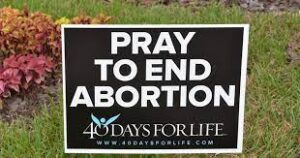1. Regarding Orthodox who have abortions
First, can Orthodox women who have abortions be forgiven? Of course. Only one sin is unforgivable, and this isn’t it. (See Mark 3:28–29, Matthew 12:31–32, Luke 12:10) That in no way diminishes the gravity of abortion.
As I understand it, from ancient times the Orthodox Church has handled sins pastorally, not juridically – less concerned with culpability and punishment, but rather with helping people overcome sin and get back “on the mark”, while still preserving the principle involved.
In the early Church any who had fallen into major sins were given a “discipline” which consisted of being excluded from the sacraments for a time. This was applied to all who murdered or killed for any reason.
Women who had abortions were excluded from the sacraments for a period of time. (Were the men who were responsible for  the pregnancy given the same discipline? If not, why not?) The length of the discipline varied. For example, Saint Basil recommended a few years for soldiers who had killed in war, ten years for a woman who had an abortion. Saint John
the pregnancy given the same discipline? If not, why not?) The length of the discipline varied. For example, Saint Basil recommended a few years for soldiers who had killed in war, ten years for a woman who had an abortion. Saint John  Chrysostom said the period of discipline for abortion should be ten years, or shorter according to circumstances. To what extent this was carried out in practice, we do not know. *
Chrysostom said the period of discipline for abortion should be ten years, or shorter according to circumstances. To what extent this was carried out in practice, we do not know. *
- In Western legalistic society, pass a law and it must be enforced. List a price and that’s what must be paid. Traditionally in the East, list a price and you dicker about it. The Orthodox Church’s laws are to be applied taking circumstances into account. Consider: In modern times Orthodox men have participated in the killing of multitudes of innocent people in war without having to undergo any sort of discipline. So if you should read somewhere (as I just did) that the Orthodox Church allows absolutely no abortions at any time, please know 1) that is not what our heirarchs said (see last week), and 2) that in practice the circumstances are also taken into consideration.
Lesser evils must always be balanced against greater evils. Is abortion always the greatest evil? I do not think so. As I said last week, if it were why did our Lord Jesus and the Apostles never even mention it?
I think most Orthodox priests and bishops still use this kind of discipline when dealing with major sins. I did.
Here would be two extreme examples:
1 In the case of a wealthy woman who got pregnant when she and her husband could have avoided it, and then they didn’t want to be bothered with a baby, so she had an abortion: I say both mother and father should be excluded from the sacraments for a long time.
2 What if it was a 14 year old girl with mental difficulties, living in poverty, the pregnancy the result of rape, the baby seriously deformed and her life threatened? A priest should not formally give his blessing to an abortion. * But in this case I would approve it and would impose a very short period of discipline. Like two hours.

- The Russian Orthodox practice of blessing weapons of war is equally bad. Bless soldiers, yes, and pray for their safety, but don’t bless missiles and bombers. Russian Media
To repeat: The Church’s discipline is intended not as punishment but to make it clear that taking human life, unborn and born, is always an objective evil, and to help the person to get back on the straight and narrow again – and to recover, for to many women having an abortion is a traumatic experience.
That is our discipline within the Church.
2. How to apply Orthodox principles about Abortion to Society
The American Situation
First, let’s look at what we’re dealing with.
A woman’s right to an abortion is widely accepted. Only 8% of Americans say abortion is never acceptable. Pew research says: “Currently, 61% of Americans say abortion should be legal in all or most cases, while 37% say it should be illegal in all or most cases.”
Here’s a kicker: While a number of our heirarchs want civil authorities to “ban the evil practice of abortion”, 53% of American Orthodox Christians say abortion should be legal in all or most cases. 45% say abortion should be illegal in all or most cases. https://www.pewresearch.org/religion/religious-landscape-study/views-about-abortion/
This does not mean 53% of Orthodox approve of abortion, only that they believe that in most cases it should not be made a civil criminal offense.
This may mean (we can’t know) that there are many abortions among Orthodox women unknown to their pastors, spiritual advisors or confessors. Also, I suspect that when Orthodox women do come for guidance about abortion, often they are dealt with more gently than our Orthodox principles would suggest. (Speaking only for myself, there’s a saying: “Young priests know the rules. Old priests know the exceptions.”)
Can we end Abortion?
I see signs in front of peoples’ houses and churches: “Pray to end abortion”. I wish… Who doesn’t? Does anyone think abortion is a good thing?
 However, brothers and sisters, may we please set a reasonable goal. Abortions there have always been. Abortions there will always be, until the Kingdom of God comes.
However, brothers and sisters, may we please set a reasonable goal. Abortions there have always been. Abortions there will always be, until the Kingdom of God comes.
Jesus said prayer works, so keep praying. But prayer won’t end abortion.
The real question is:
How can we reduce the number of abortions?
Keep in mind here: Statistics where abortion is legal are probably fairly accurate. Statistics where abortion is illegal are almost certainly inaccurate, because many abortions take place sub rosa. So if the number of abortions in the US will now appear to be declining, don’t believe it. Maybe they are. Maybe they aren’t. We’ll never know.
Here are three possible ways to reduce the number of abortions, which in my opinion are least effective.
1 Learn how to do it from the Orthodox countries.
We’re Orthodox. This seems a reasonable place to start.
I discover that abortion is legal in all traditionally Orthodox countries, often “on demand” up to 12 or 15 weeks, with some restrictions after that. * Is this a carryover from Communist days when abortion was available without restriction? I doubt it. The Communists have been gone for over thirty years now, and Greece was never a Communist country.
* For details, search “[Country] abortion laws”.
Here are abortion rates in the US and in Orthodox lands, taken from the World Health Organization, which I think is the most consistent source of information:
https://worldpopulationreview.com/country-rankings/abortion-rates-by-country (On the map push on each country for which you want this information.)
Abortion rates (per 1000 women)
USA – 20.8, (Canada – 15.2, UK – 17)
Orthodox countries: Greece – 5.0 *, Bulgaria – 21.3, Ukraine – 27.5, Roumania – 27.8, Belarus – 31.7, Russia – 53.7 *
* I checked elsewhere, thinking surely these figures for Greece and Russia must be inaccurate. They are not. Greece’s abortion rate in 2007 was 7.8 and has declined since then. All sources I’ve seen say Russia has by far the highest abortion rate of all major countries in the world. Holy Mother Russia – home of “traditional Christian values”?
So it would appear, sadly, that we in America haven’t much to learn about how to reduce the number of abortions from the old Orthodox lands …
…with the apparent exception of Greece. We’ll look at Greece later.

2. Stage anti-abortion protests in front of abortion clinics.
I can’t find any unbiased information online as to their effect, positive or negative.
3. Reverse Roe v. Wade.
Will this actually reduce the number of abortions?
As I said, we’ll never know, because many abortions will take place in secret, some in illegal abortion clinics of dubious quality, damaging women’s long-term health, or they’ll try to do it at home, with even worse effects. Some women who have the money and time will travel to other states or countries for abortions. Others will get abortion pills through the mail in envelopes with no return address. The “authorities” certainly won’t be able to check all the mail. In some of the US’s more totalitarian states, the authorities will likely try to get access to women’s search or e-mail histories, but there are ways to get around that. In some cases women or their friends will go across state lines to get the pills. Are the authorities going to check all the cars on the freeway? go through every suitcase and shopping bag?
If women are apprehended having (or planning to have) abortions, will they really be sent to prison? in some states executed? Can you imagine the national revulsion at that?
I think criminalizing abortion (as is now happening in about half the states) is going to work about as well as Prohibition of alcohol did back in the “Roaring Twenties” (1920-1933). It was a serious attempt to deal with a real problem: Americans had a long tradition of consuming copious amounts of alcohol. Prohibition was promoted by 1) the Woman’s Christian Temperance Union, who wanted to end the abuse of wives and children by drunken husbands, and 2) high-minded political liberals.
 Outlawing murder is effective, because everyone believes murder is wrong. Outlawing drinking didn’t work, because most people still wanted to drink. Outlawing abortion won’t work, because a large majority of American people believe it should remain legal.
Outlawing murder is effective, because everyone believes murder is wrong. Outlawing drinking didn’t work, because most people still wanted to drink. Outlawing abortion won’t work, because a large majority of American people believe it should remain legal.
Prohibition briefly appeared to reduce drinking, but only till people found a way around the law. Statistics say it returned to  about 70% of what it had been before, but actually no one knows because here, too, much of it went on behind the scenes – in sleazy nightclubs and the like, which were allowed to exist because civil authorities and police and sometimes organized crime (“the mob”) were paid off. Or liquor was made and drunk at home (“bathtub gin”).
about 70% of what it had been before, but actually no one knows because here, too, much of it went on behind the scenes – in sleazy nightclubs and the like, which were allowed to exist because civil authorities and police and sometimes organized crime (“the mob”) were paid off. Or liquor was made and drunk at home (“bathtub gin”).
Al Capone
All told, Prohibition resulted in 1) several generations of disrespect for law, 2) organized crime, and 3) increased alcoholism. Have you ever watched movies from the late ’30s and ’40s? Prohibition was gone, and now people were celebrating by drinking like fish. Heavy drinking was so commonplace that it became part of comedy routines on radio and television. “And the last state was worse than the first”. America has recovered from Prohibition only in recent times.
If you want to know more, read this analysis from a conservative site: https://www.cato.org/policy-analysis/alcohol-prohibition-was-failure
I think the results of criminalizing abortion will be similar: Hidden dangerous abortions, increased disrespect for law, perhaps organized crime. In addition, we will have an even more divided nation because of the way in which Roe v. Wade was reversed. And in our litigious society, it will create a generation or two of venomous litigation, and a bunch of rich lawyers.
Also, many repercussions of reversing Roe v. Wade are yet to be known, about which I’m not going to speculate. Except for this one: Since religious freedom seems to be one of the big issues here, what about the Jews and Muslims? Because abortion is not condemned in their Holy Scriptures (“Old Testament” to us), Jews are not opposed to abortion. Likewise Muslims with the Koran. There are 7.5 million Jews and 3.45 Muslims in the US. Are they to have religious freedom?
Will reversing Roe v. Wade reduce the number of abortions? My guess is that it will not.
When I first lost interest in reversing Roe v. Wade, a good friend asked me: “Are you ok with abortion now?” I cried “No! I hate abortion. I despise abortion. It’s just that I now think there are better ways to deal with it.”
How can we reduce the number of abortions?
Here are the things which I think are most likely to work:
1. Reduce the number of unwanted pregnancies, and the best way to do that is to prevent unwanted pregnancies.
Abstinence outside marriage is the Church’s teaching, and I believe it is the best way to go. It should be taught in school – and certainly to our Orthodox young people. But here, too, we should face reality. It won’t be taught in most schools. In entertainment, in the media and in what we see all around us, sexual abstinence outside marriage is made to seem ridiculous. Many of our young people these days are not going to abstain.
So at the same time our young people should be taught methods of birth control (properly “conception control”). At what age? I’m not sure. But better too early than too late.
Some who most strenuously oppose abortion (the Roman Catholic Church, for example) also oppose birth control. One member of the US Supreme Court, a conservative Roman Catholic *, now wants to outlaw birth control. Think, people, think! Where do babies come from? Have you never heard of “cause and effect”?
- Six of the nine justices of the US Supreme Court are Roman Catholics.
The argument seems to be that using “artificial means” to limit and schedule pregnancies is not in accord with nature. It seems to me that we use “artificial means” to deal with many things in life in ways that are not in accord with nature. Like using your alarm clock to wake you before dawn in the wintertime.
2. Provide support for pregnant women.
Especially health care for poor pregnant women, so they won’t be so tempted to abortion. God bless religious and other private charity organizations for what they do in this regard, but it’s obvious private charity alone isn’t able to handle the situation.
Of the 33 most industrialized countries in the world, all provide paid maternity leave (to one degree or another), except for one. That one (no surprise) is the United States, which requires 12 weeks unpaid maternity leave, with exceptions even to that in a number of cases. Can poor mothers afford 12 weeks unpaid?
3. Learn from Greece
As you’ll remember from above, Greece seems to have an exceedingly low abortion rate – 5.0.
Is this because Greece has strict abortion laws? No. Greece’s abortion laws are quite relaxed: Greek law permits abortion on demand up till 12 weeks, in case of rape or incest up to 19 weeks, in case of fetal abnormalities as late as 24 weeks. In case of inevitable risk to the life of the mother, or risk of serious and continual damage to her physical or mental health, abortion is permitted anytime before birth. Girls under 18 must get written permission from a parent or guardian before being allowed an abortion.
So why do the Greeks have so few abortions? I don’t know. However, in my research above, I discovered that the country that provides the best paid maternity leave is… Greece, which requires 43 weeks paid maternity leave, averaging 61.8% of full salary. See: https://www.business.org/hr/workforce-management/paid-maternity-leave-across-the-world/
Many factors can enter in here, and I know statistics can be inaccurate or misleading, but I wonder if we have just explained something. Has anyone researched this?
4. Bring more people to the Orthodox Church…
…so they will understand Orthodox principles and the Orthodox lifestyle. However, at the present rate of Eastern Orthodox non-growth in America… That will be the topic for next week.
5. Vote in an Orthodox way.
Unlike some denominations, the Orthodox Church does not tell us what political position we should take, or how to vote. This is a matter for each person’s conscience.
In the case of abortion: Decide for yourself what you think will be most effective to reduce the number of abortions. Put this into the context of the many other issues. Which do you think are most important? Remember that Orthodox teachings do not fit neatly into any political category: we are neither left wing nor right wing nor conservative nor liberal nor middle of the road. We come from Somewhere Else.
Being Truly Pro-Life
As our Hierarchs wisely pointed out in their June 22 letter (see last Post) being Pro-Life involves many matters, not just abortion.
Enormous numbers of innocent lives are also taken in war, creating far  more objective evil than abortion – for those killed are not only unborn babies but “born” babies and their fathers and mothers and families, leaving countless orphans, and starvation. Deaths of innocent civilians: the Vietnam War – about 10,000,000; Iraq War – perhaps 250,000; Syria, to date – about 350,000. Yemen, to date – almost 375,000. War also results in abortions by desperate refugee mothers.
more objective evil than abortion – for those killed are not only unborn babies but “born” babies and their fathers and mothers and families, leaving countless orphans, and starvation. Deaths of innocent civilians: the Vietnam War – about 10,000,000; Iraq War – perhaps 250,000; Syria, to date – about 350,000. Yemen, to date – almost 375,000. War also results in abortions by desperate refugee mothers.
There are also sins of omission: Human lives are lost when people die for lack of health care. Human lives are lost when people starve to death. Worldwide over 750 million people now suffer from malnutrition, and today almost 50 million are at risk of starvation because of famine – and it’s getting worse because of Covid and now the war in Ukraine, which is causing food shortages in poor countries.
Many human lives are taken day after day, in our permissive society, by gun violence. Over 21,000 gun deaths in the US in 2021 – excluding suicides which would make the number considerably higher.
Today the only major nations which still retain the death penalty are the Muslim countries, China and the United States.
Either all life is sacred, or it is not.
The End
Dear ones, as I said at the beginning, this has been a subject very difficult for me to deal with, confusing to research, demoralizing to think about and hard to write about. I’m sure it has been equally difficult for you to read about. Thank you for hearing me out, and God bless you for hanging in.
Next Week: Why is American Christianity Declining? You get to tell me.
Week after Next: Let’s find something quiet and pleasant to talk about.
Thank you, Fr. Bill, for this very thoughtful post. I basically agree with everything you’ve said, and I applaud your courage for writing this post.
Thank you for a lucid explanation of the Orthodox view. I was elated to read that all life is sacred not just the unborn. This mirrors my own view but with a much better explanation than I can achieve. I also appreciate the idea about men being responsible as well. After all, women can not make themselves pregnant. As a Canadian, our issues are somewhat different but we need to be concerned about developments in our neighbor to the south. Women of means may want to come north for medical assistance.
Thank you. I forgot we have readers in Canada and the UK, so I added the Canadian and UK abortion rates to the Post. (What a way to say thank you!)
Thank you, Father Bill, for this balanced view on this difficult subject !
Thank you for this wisdom. I’ve been wrestling with it in so many ways, both as a woman and as an Orthodox Christian. This sums up my thoughts and validates my feelings on the situation. I have always considered myself pro-choice and anti-abortion, knowing that we should offer women better than this barbaric practice and aways advocating for family planning within reason and never teaching abstinence only, even to my own children (abstinence first, but birth control because we are all sinners). It’s a complicated issue, a stain on our society, and a symptom of a much larger problem. I do appreciate the fact that you address men in this act, because I do too, as a mom of boys. As someone who was once a single mother, I’m very sympathetic to a woman who chooses abortion to the desolate slow death of poverty, and the trauma of giving up a child for adoption. Adoption itself is rife with corruption in the world, and an industry in and of itself in the US. People buy babies and society leaves a birthmother to grieve alone before helping a single mother raise her child. And adopted children grow up traumatized as well (statistically, they’re 3 times as likely to suffer from mental illness and commit suicide). Which is the more Christlike example? Giving or taking?
Thank you, Maria. However, I don’t know that I offered much “wisdom”. These are complex issues, and I think there are no simple easy solutions. Or at least I don’t have them.